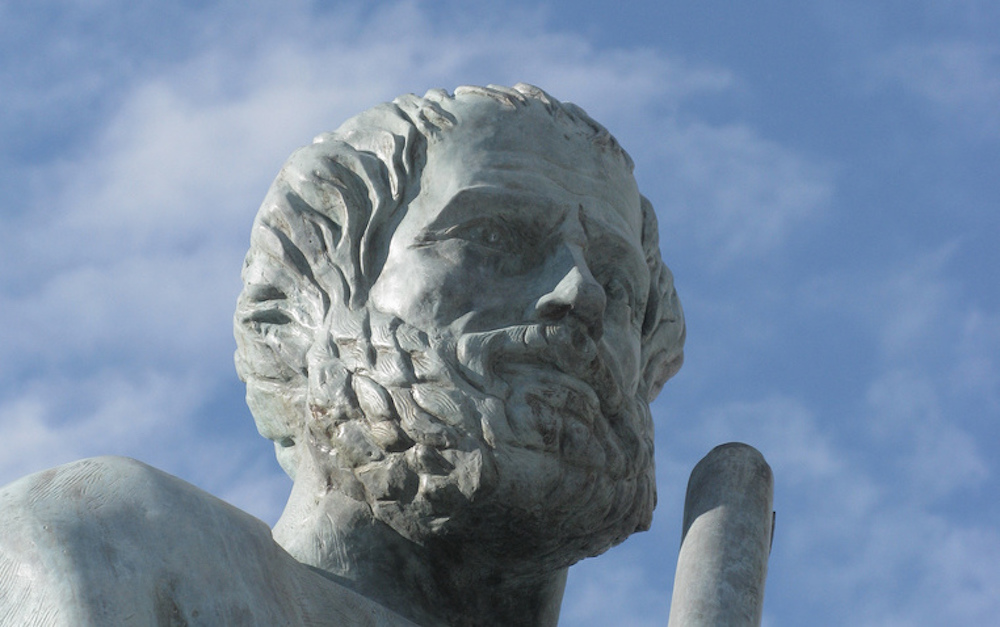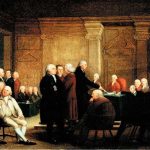Is the American project doomed because the Enlightenment liberal philosophy on which it is based contains such contradictions that today’s social and political failures were inevitable? Or are we inflicting disintegration on ourselves through bad thinking and bad choices in more recent times, committing a kind of cultural suicide? These are among the happy choices offered by prominent conservative thinkers at the moment.
Leslie Rubin offers a more textured, temperate analysis of the roots of our current civic decay in America, Aristotle, and the Politics of a Middle Class. Her diagnosis also contains a plausible compass for restoring civic health. She argues that the American republic was more Aristotelian and moderate at its founding than most scholars have appreciated. Because our social and political foundations were more middling and practical than the grand theories of modern liberalism, classical republicanism, or political philosophy can see, the path to restoring political decency is hardly impossible.
Moreover, many American founders agreed with Aristotle that while humans are happiest in such a stable political community dominated by people of middling social and economic status—free to argue but committed to seeking a common good—it is not easy to build or sustain such orders. We also can rediscover their prescient counsel on the civic education needed to promote respectable virtues and to shun the vices of materialism, individualism, and sectarian fanaticism that can doom politics.
The “Happy Mediocrity” Sought by Aristotle and the Founders
Start your day with Public Discourse
Sign up and get our daily essays sent straight to your inbox.The path to recovery is difficult to discern for today’s theorists and intellectual schools—progressive and liberationist especially, but also for some conservatives. Rubin argues that there is substantial consonance between Aristotle’s sober political science and the first American political science epitomized by Federalists such as Adams, Hamilton, and Madison as well as some Anti-Federalist writers. Our challenge in the twenty-first century is to seek and perceive the enduring human nature that was evident to political minds in such disparate milieus as fourth-century B.C. Greece and eighteenth-century A.D. North America but is concealed by more recent, fancier theories.
Such theories arose from the radically modern and post-modern pride that recent thinking is better because it is liberated from classical and medieval myths about human nature. Any congruence of American founders and Aristotle’s political science on a middle class is, to the liberated, merely perpetuation of the myopia that philosophy should understand human nature and develop its better features. Rubin sees a polarized twenty-first-century America, disintegrating socially and politically, and doubts that emancipation from classical political philosophy and the moderate Enlightenment is working out so well.
Her distinctive argument is that we need not return all the way to the philosophers of Greece and Rome to discern their influence and their appealing guidance for a free but also decent politics. The philosophical center of gravity in America’s founding thought—especially the spirit of the 1787 Constitution—is a blend of classical and modern insights. This is surprising news to twenty-first century readers and scholars, but would not be so for the founders and their near contemporaries.
In effect, Rubin prods us to consider why we have Virgilian Latin in the great seal of 1782, and thus on the dollar bill today; and why so many writers for and against the Constitution adopted names of Athenian and Roman statesmen—including Brutus, Cato, Publius, Aristides, Phocion, and Agrippa. In particular, she reminds us that John Adams labored in 1787, in an early treatise of American political science, to commend those parts of Aristotle’s Politics that elevate a mixed or balanced regime dominated by a class of middling wealth, and to criticize Aristotle’s more Platonic, elitist moments.
Aristotelian without Reading Aristotle?
Rubin thus corrects one of Tocqueville’s striking portraits of American liberal democracy. According to Tocqueville, Americans’ intellectual spirit reveals a deep influence of Cartesian modernism: we eschew tradition and abstract theories in favor of pragmatic testing of what works now. Americans are Cartesian without, however, having read Descartes; we enact his modernist, anti-traditionalist theory but are too busy finding new, workable ideas ever to study him. Of course, Tocqueville also finds many Christian, common law, and classical republican elements in America. He admires the civic sobriety and virtue of Washington and the Federalists, the anti-Federalists’ spirit of local self-government, and the Christian foundations for enlightened self-interest. He knows these pillars of American social and political order have classical and medieval origins, and he commends them as such.
In effect, Rubin fuses these two strands of Tocquevillean thinking by proposing that America’s founders were more Aristotelian than many of them knew. A few, like Adams, invoked the old scientist while founding the new constitutional order. Most were too busy advocating decently middle class and republican ways to mention the Greek philosopher who first developed this view of the best, most practical form of politics.
This is a bold and novel thesis, by a scholar who knows both classical political philosophy and the thought of America’s founders. Other scholars have argued that classicism deeply shaped the political and social thought of the founding; a few even deem it the matrix into which Christian and Enlightenment elements were incorporated. Rubin’s excavation of the parallels between Aristotle’s mixed regime featuring a middle class and the American founders’ emphasis on the sober virtues of a middling social and economic status holds itself to a middle ground. Her argument must now must be tackled by any serious student of the founding.
Rubin’s thesis is bold, commonsensical, and philosophically moderate all at once. She avoids the extremes that would see a fundamental contrast between ancient and modern thought or would see only insignificant differences. Instead, we find in her work a subtle exploration of a higher middle ground: a modern adaptation of classic wisdom, philosophically sound and practically beneficial.
All Things Moderate and Middling, All Virtues Great and Small
Rubin emphasizes that Aristotle and the moderate Americans share a political science of a complex, balanced constitutionalism that resists political extremes. Her distinctive stance is that a scholarly emphasis on the difference between classical natural right and modern natural rights unhelpfully obscures the shared conception of politics as pluralism and argument, as well as the shared institutional and social structures entailed by this orientation.
Rubin makes a compelling case that we should favor quotidian, middling virtues—basic civic duty (including military service), reasonableness and civic friendship across economic and party lines, moderate wealth and industriousness paired with liberality toward the needy, and moderate ambition in politics under the rule of law—and support them through laws, institutions, and education. In this way, we can promote civic peace by encouraging citizens to form moderate rather than fanatical views about economics and partisanship. Such a political science and civic education would not need dramatic appeals to the better angels of our nature to preserve civic peace and a respectable common good; an everyday appeal to enlightened self-interest provides support for a reasonable, law-governed order.
Rubin’s study therefore not only enriches political theory within the academy. It is also a practical response to the civic disaster produced by our fancy theories of liberation from all such constraints, forms, rules, and traditions—from middling, decent virtues.
Her concluding chapter offers specific advice for political scientists, civic leaders, and educators about the sober ideals we must restore. The middling politics advocated by Aristotle and the founders is morally decent as well as institutionally balanced. It requires wariness of passions and demagoguery, calls the middle-class majority toward civic duties to vote intelligently and perform other service, and perpetuates a decent moderation through moral education, helping us to avoid extremes of poverty or luxury, cynicism or utopianism, passion or apathy.
A Way Forward: Improving Civic Education
Alas, America, Aristotle, and the Politics of a Middle Class is both Rubin’s masterwork, culminating a career of scholarship and teaching, and her last work, given her untimely death just as Baylor University Press undertook publication. It falls to us to pursue her particular thesis—and adopt the spirit of philosophical moderation and avoidance of doctrinairism that she manifests in her studies of political philosophy, political science, the American founding, and the healthy civic culture of a liberal republic.
We should develop Rubin’s prescriptions for political science and civic education into curricular plans, both for universities and schools. In that process, we might pay more attention to Washington’s Farewell Address as advocating precisely a middle-class republicanism that blends private prosperity with civic friendship. Rubin briefly cites the Address, but more could be made of Washington’s biography and his public writings as epitomizing the Aristotelian-American high middle ground. Similarly, Washington and Hamilton should get credit for advocating a national university to perpetuate such a balanced, complex republic (and the university’s opponents should be duly censured).
Rubin rightly emphasizes the discourse on civic education at the founding, recovering the blend of moral, professional, and civic education articulated by Benjamin Franklin, John Adams, Noah Webster, Thomas Jefferson, Benjamin Rush, and more obscure figures such as Robert Coram, Nicholas Collin, and Jeremiah Atwater. Her discussion of Rush and his early advocacy of a national university is priceless. We could emphasize his attention to religious education blended with civic education—how virtues of humility, moderation, frugality, and self-responsibility support republican virtue.
Finally, we could emphasize Montesquieu and his successors as the crucial bridge from Aristotle and medieval philosophical moderation to America’s founders. His political philosophy holds moderation as its central principle—moderation about ideas and institutions, mores and partisan freedom. Many leading Americans did not know how Aristotelian they were because they had absorbed such ideas through Montesquieu’s balanced political science.
Leslie Rubin’s final work is a resource for all who are alert to the intellectual and civic crises caused by various extreme or singleminded views of recent centuries. Her detailed and balanced analysis of the moderate spirit of Aristotle’s political science, and of an analogous moderation in America’s founding political thought, is an intellectual achievement. It elevates our conversations in political philosophy, and about constitutional liberal democracy. Her argument also achieves, in practice, the Aristotelian standard she believes best for political science: that scholars also should make a civic contribution, as the minimal duty of grateful citizens.













